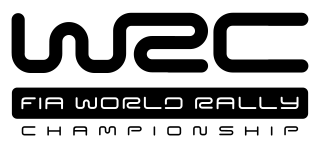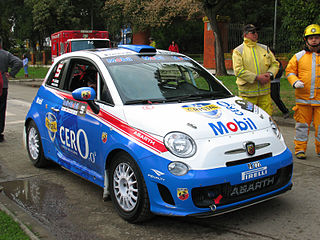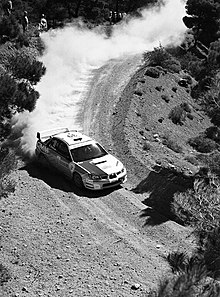
The World Rally Championship is an international rallying series owned and governed by the FIA. Inaugurated in 1973, it is the second oldest international motorsport series in the world after Formula One. Each season, which lasts one calendar year, separate championship titles are awarded to drivers, co-drivers and manufacturers. There are also two support championships, WRC2 and WRC3, which are contested on the same events and stages as the WRC, but with progressively lower maximum performance and running costs of the cars permitted. Junior WRC is also contested on five events of the World Rally Championship calendar.

The FIA Junior WRC, also known as JWRC and previously known as Junior World Rally Championship, is an international rallying competition restricted to drivers under 29 years old. The championship currently consists of five select rallies of the FIA World Rally Championship (WRC) calendar. The category has been a stepping stone in the careers of Sebastien Loeb and Sébastien Ogier, Dani Sordo, Elfyn Evans, Craig Breen and Thierry Neuville.

In relation to international motorsport governed by the FIA, Group N refers to regulations providing "standard" large-scale series production vehicles for competition. They are limited in terms of modifications permitted to the standard specification by the manufacturer making them a cost effective method of production vehicle motorsport. Often referred to as the "showroom class", Group N contrasts with Group A which has greater freedom to modify and tune the cars to be more suitable to racing. Both groups may have the same or similar models homologated by a manufacturer.

Alister McRae is a British rally driver from Scotland who competed in the World Rally Championship. He is the son of the five-time British Rally Champion Jimmy McRae and the younger brother of the late 1995 World Rally Champion, Colin McRae, and older brother of property entrepreneur Stuart McRae. His uncle Hugh "Shug" Steele is also a former rally driver.

M-Sport is a motorsport engineering company headquartered at Dovenby Hall near Cockermouth, United Kingdom. It is primarily known for entering the FIA World Rally Championship (WRC) since 1997 in partnership with Ford, manufacturing race and rally cars, and providing parts and motorsport services to customers. The company has an automotive evaluation facility at its headquarters, and a second manufacturing facility in Balice, Poland.

Super 2000 is an FIA powertrain specification used in the World Rally Championship, the British Touring Car Championship, the World Touring Car Championship, and other touring car championships. The engines were originally 2 L naturally aspirated, and later being also allowed 1.6 L turbocharged units producing approximately 280 bhp.

The Asia-Pacific Rally Championship (APRC) is an international rally championship organized by the FIA encompassing rounds in Asia and Oceania. Group N cars dominated the championship for many years but in recent years cars built to R5 and S2000 regulations have tended to be the frontrunners.
The 2010 World Rally Championship was the 38th season of the FIA World Rally Championship. The season consisted of 13 rallies, beginning with Rally Sweden on 11 February and ended with Wales Rally GB on 14 November.

Juho Ville Matias Hänninen is a Finnish rally driver. He is the 2010 Intercontinental Rally Challenge (IRC) champion and 2011 Super 2000 World Rally Championship (S-WRC) champion with co-driver Mikko Markkula driving a works entered Fabia S2000 for Red Bull Škoda. He also won the 2004 Group N Finnish Rally Championship title, and debuted in the World Rally Championship during the 2006 season.

Alessandro "Alex" Fiorio is an Italian rally driver. He debuted in the World Rally Championship in 1986. Driving the dominant Lancia Delta Integrale for the Lancia "B-team" Jolly Club, he finished third in the drivers' world championship in 1988 and second in 1989. His father Cesare Fiorio was a former racer, the head of Lancia's factory WRC team and sporting director for Scuderia Ferrari.
The 2011 World Rally Championship was the 39th season of the FIA World Rally Championship in automobile racing. The season consisted of 13 rallies, beginning with Rally Sweden on 10 February and ended with Wales Rally GB on 13 November.
The FIA WRC2 Championship is a support championship of the World Rally Championship (WRC). The calendar consists of the same rallies and stages as the parent series and crews usually compete immediately after Rally1 class crews. WRC2 is limited to production-based cars homologated under Group Rally2 rules. There are separate specific championship titles awarded to Teams, Drivers and Co-Drivers.

The 2012 World Rally Championship was the 40th season of the FIA World Rally Championship. The season consisted of thirteen rallies, beginning with Monte Carlo Rally on 17 January, and ending on 11 November with Rally Catalunya.

In relation to motorsport governed by the Fédération Internationale de l'Automobile, Group R refers to a set of regulations providing production-derived vehicles for rally competition. The Group R regulations were gradually introduced from 2008 as a replacement for Group A and Group N rally cars.

The 2013 FIA World Rally Championship-2 was the first season of the World Rally Championship-2, an auto racing championship recognised by the Fédération Internationale de l'Automobile, running in support of the World Rally Championship. It was created when the Group R class of rally car was introduced in 2013.
The FIA Super 2000 World Rally Championship was a support championship of the World Rally Championship (WRC) that ran for three seasons from 2010 to 2012.
The FIA WRC3 is a support championship of the World Rally Championship. The calendar consists of the same rallies and stages as the parent series and crews usually compete immediately after WRC2 entrants. Entry into WRC3 is limited to cars that are based on production models and homologated under Group Rally3 rules, although prior to 2022 Group Rally2 cars were used. There are championship titles awarded to drivers and co-drivers. The series began in 2013 and was limited to production-based cars homologated under the R1, R2 and R3 rules, until its cancellation at the end of 2018. The current format of the series began in 2020.
The FIA Rally Pyramid is the collective description and organisation of championships, car performance classes and driver aptitude in international rallying. In 2019 the FIA rally commission presented a radical overhaul to the rally pyramid to introduce common nomenclature and structure of the international championships and car classes used across the sport in a similar way to terminology used in formula racing. At the top of the pyramid, Rally1 describes elite level of driver aptitude and car performance in the World Rally Championship (WRC). At the foot of the pyramid is Rally5, designed for cost effective introductory rallying competition.

In the motorsport discipline of rallying, Group Rally2 is a formula of rally car specification determined by the FIA for use in its international competitions: the World Rally Championship (WRC) and regional championships. National rallying competitions also allow Group Rally2 cars to compete. There are no subclasses despite the use of the word 'Group' in the name so 'Rally2' may be used alone with the same definition. The group was launched in 2019 with other similarly named groups after the introduction of the Rally Pyramid initiative to reorganise the classes of car and championships in international rallying was approved in June 2018.













